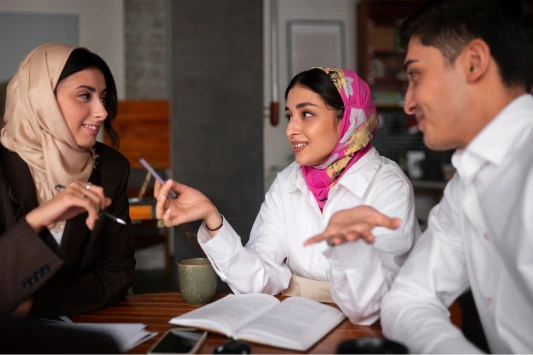




The Arabic language has a long history that dates back more than 1,500 years. As Islamic empires evolved, they began on the Arabian Peninsula and subsequently sprawled over the Middle East, North Africa, and beyond.
Popular Universities
Online BBA
1 University
Online BCA
1 University
Online BCom
1 University
Online MA
1 University
Online MBA
1 University
Online MCA
1 University
Online MCom
1 University
B.Tech For Working Professionals
1 University
M.Tech For Working Professionals
1 University
Online MSc
1 University
Online BA Honours
1 University
Online BCom Honours
1 University
Hospital and Health Care Management
1 University
Digital Marketing
1 University
PGCP in in Business Analytics
1 University
PGCP in Logistics and Supply Chain Management
1 University
Machine Learning And Generative AI
1 University
Executive Master of Business Administration (EMBA)
1 University
Advanced Diploma Prorgam in Dietetics and Therapeutics Nutrition
1 University
Advanced Diploma Program in Drug Regulatory Affairs
1 University
Law
1 University
Pharmacy
1 University
Education
1 University
PhD
1 University
Diploma in Bakery and Confectionery Technology (DBCT)
1 University
Certificate Program in Modern Persian Language (CMPL)
1 University
Distance MBA
1 University
Global MBA
1 University
Dual MBA
1 University
Online PGDM
1 University
1 (one) Year MBA Online
1 University
Online MBA and Doctorate
1 University
Integrated Online MBA Program
1 University
Distance BA
1 University
Distance BBA
1 University
Distance BCA
1 University
Distance BCom
1 University
Online B.Sc Honours
1 University
Online BSc
1 University
Online BBA Honours
1 University
Distance BSc
1 University
BCA + MCA Integrated Online
1 University
BBA + MBA Integrated Online
1 University
BCom + MBA Integrated Online
1 University
B.Tech After Diploma
1 University
Online MBA after Diploma
1 University
Online BBA Dual
1 University
Part-Time BTech
1 University
Advanced Diploma in Medical Record Technology
1 University
Online Bachelor of Arts
1 University
About Diploma Program in Professional Arabic (DPA)
The goal of the Diploma in Professional Arabic Course (DPA) is to provide students with a strong foundation and proficiency in Arabic, a language that is becoming more and more popular worldwide. Regardless of your professional aspirations—working in international relations, diplomacy, translation, or language proficiency—this certificate provides a structured path to success. Arabic is one of the languages that is spoken by more than 400 million people globally and is recognized as an official language in 22 countries.
Arabic is extensively utilized in literature, culture, religion, and diplomacy. Speaking this language requires employment in fields including law, media, tourism, and international trade. This course claims to expose students to Arabic's rich historical and cultural background in addition to teaching the language, preparing them for using it in professional contexts.
This comprehensive guide will cover the following topics: the background of Arabic, prerequisites for DPA enrollment, the admissions process, the duration and cost of the course, the mode of instruction, and career opportunities for DPA graduates.
The Arabic language has a long history that dates back more than 1,500 years. As Islamic empires evolved, they began on the Arabian Peninsula and subsequently sprawled over the Middle East, North Africa, and beyond. Modern Standard Arabic (MSA), which is used in formal and official contexts including journalism, literature, and diplomacy, is derived from Classical Arabic, the language of the Quran. Over antiquity, other regional varieties of Arabic have emerged, but MSA remains the standard language spoken throughout all Arabic-speaking nations.
Important contributions to philosophy, science, theology, literature, and the arts—especially from the Islamic Golden Age—have also been preserved in Arabic. Many other languages, including Persian, Turkish, and even European languages like Spanish and Portuguese, have been influenced by the language's structure and vast vocabulary, which provide an unmatched richness.
To be eligible for a Diploma in Professional Arabic (DPA) course, candidates must fail the following prerequisites:
Semester 1 | Semester 2 |
Arabic Text (Dialogue and Conversation) | Applied Arabic Grammar & Translation |
A wide spectrum of students can enroll in the Professional Arabic Diploma program due to its reasonable course costs. The normal semester tuition for the program is between INR 3,000 and 5,000, depending on the academic year and any applicable subsidies. Students are recommended to confirm course costs on the official university website since the program tuition structure is subject to change.
Diploma in Professional Arabic Language (DPA) | Semester 1 | Semester 2 |
Registration/Application Fee (One Time) | ₹ 500/- | – |
Program Fee | ₹ 2,500/- | ₹ 2,500/- |
Examination Fee | ₹ 2,000/- | ₹ 2,000/- |
Total Semester Fee | ₹ 5,000/- | ₹ 4,500/- |
Total Fees | ₹ 9,500/- |
The Diploma program in Professional Arabic language leads candidates to opt for an array of career opportunities. However, some of them are mentioned below:
A1. Yes, several universities or educational institutions are offering Diploma in Professional Arabic Programs through online modes of learning allowing learners to master the program flexibly and at their own pace and convenience from the comfort of their homes.
A2. Prior knowledge of the Arabic language is optional for learners who are willing to enroll in the program and aspire to a career in the domain.
A3. The Diploma program in Professional Arabic Language (DPA) opens up doors to an ocean of career opportunities for graduates including translators, interpreters, language teachers, diplomats, international trades and media professionals, and more.
Already have an account? Sign In
The Online BTech Work Integrated Learning Program (WILP) is...
The Online MTech Work Integrated Learning Program (WILP) is...
There is rapid growth and transformation in the field of Hea...
The Online Post-Graduate Certificate Programme (PGCP) in Bus...
The online Post-Graduate Certificate Program (PGCP) in Logis...
Amity University Online (AU Online) acts as a panacea for hi...
This blog post aims to discuss what an Executive MBA program...
The goal of the diploma program in Dietetics and Therapeutic...
The Advanced Diploma Program in Drug Regulatory Affairs (ADD...
The Diploma Program in Bakery and Confectionery Technology (...
Language is a tool for comprehending communities, cultures,...
A 1-Year Online MBA is an accelerated management program des...
The online MBA & Doctorate Program is a dual program suitabl...
An Integrated MBA Online is a 5-year dual-degree program tha...
The BCA + MCA Integrated Online Course Program is a comprehe...
The BBA + MBA Integrated Online Course Program is a comprehe...
The B.Com + MBA Integrated Online Course Program is a struct...
An Online MBA after a diploma is a flexible and career-focus...
A Diploma in Medical Record Technology is a detailed diploma...
The online Bachelor’s of Arts is an undergraduate course whi...
Sign-in to YugEdu
For a more personalised experience, sign in with your registered email or

24800+
Wide Range of Accredited
Universities

24800+
Book Your Video
Counselling

24/7
Free Counselling

Already have an account? Sign In

24800+
Wide Range of Accredited
Universities

24800+
Book Your Video
Counselling

24/7
Free Counselling

For any enquiry, please fill the form below

Already have an account? Sign In

24800+
Wide Range of Accredited
Universities

24800+
Book Your Video
Counselling

24/7
Free Counselling